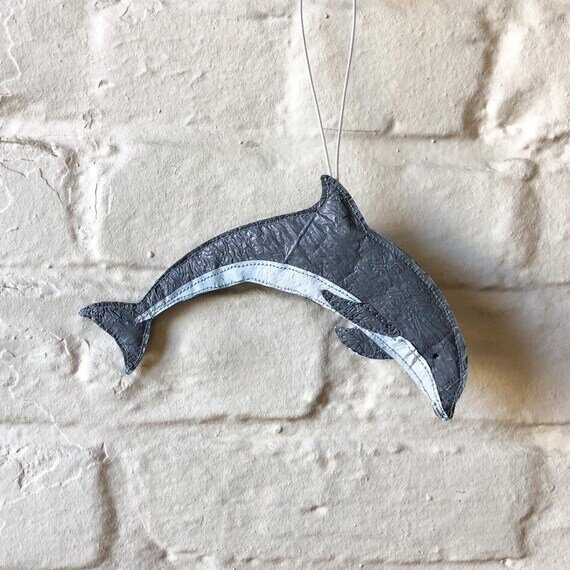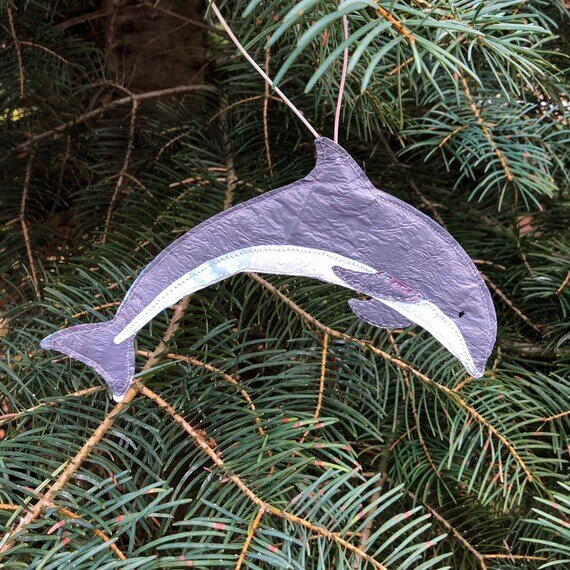Dolphin Ornament
$25.00
This 7” long handmade dolphin ornament is made from recycled plastic bags. Hang it on your car rear view mirror, your Christmas tree, in your child’s nursery or around your house.
A household takes home about 1,500 plastic bags a year, and on average, only about 5% of those bags are recycled. Littered plastic bags, which never biodegrade, often find their way into the ocean. Many marine animals mistake the bags for food. The plastic can not be digested and slowly kills tens of thousands of these animals each year. Since plastic bags take 1,000 years to break down, they last long after the animal is gone and are released back into the wild, continuing the cycle.
In an effort to find a solution for the excess of discarded plastic bags (roughly 100 billion every year), Seacyclables were born.
A household takes home about 1,500 plastic bags a year, and on average, only about 5% of those bags are recycled. Littered plastic bags, which never biodegrade, often find their way into the ocean. Many marine animals mistake the bags for food. The plastic can not be digested and slowly kills tens of thousands of these animals each year. Since plastic bags take 1,000 years to break down, they last long after the animal is gone and are released back into the wild, continuing the cycle.
In an effort to find a solution for the excess of discarded plastic bags (roughly 100 billion every year), Seacyclables were born.
Quantity:
This 7” long handmade dolphin ornament is made from recycled plastic bags. Hang it on your car rear view mirror, your Christmas tree, in your child’s nursery or around your house.
A household takes home about 1,500 plastic bags a year, and on average, only about 5% of those bags are recycled. Littered plastic bags, which never biodegrade, often find their way into the ocean. Many marine animals mistake the bags for food. The plastic can not be digested and slowly kills tens of thousands of these animals each year. Since plastic bags take 1,000 years to break down, they last long after the animal is gone and are released back into the wild, continuing the cycle.
In an effort to find a solution for the excess of discarded plastic bags (roughly 100 billion every year), Seacyclables were born.
A household takes home about 1,500 plastic bags a year, and on average, only about 5% of those bags are recycled. Littered plastic bags, which never biodegrade, often find their way into the ocean. Many marine animals mistake the bags for food. The plastic can not be digested and slowly kills tens of thousands of these animals each year. Since plastic bags take 1,000 years to break down, they last long after the animal is gone and are released back into the wild, continuing the cycle.
In an effort to find a solution for the excess of discarded plastic bags (roughly 100 billion every year), Seacyclables were born.
This 7” long handmade dolphin ornament is made from recycled plastic bags. Hang it on your car rear view mirror, your Christmas tree, in your child’s nursery or around your house.
A household takes home about 1,500 plastic bags a year, and on average, only about 5% of those bags are recycled. Littered plastic bags, which never biodegrade, often find their way into the ocean. Many marine animals mistake the bags for food. The plastic can not be digested and slowly kills tens of thousands of these animals each year. Since plastic bags take 1,000 years to break down, they last long after the animal is gone and are released back into the wild, continuing the cycle.
In an effort to find a solution for the excess of discarded plastic bags (roughly 100 billion every year), Seacyclables were born.
A household takes home about 1,500 plastic bags a year, and on average, only about 5% of those bags are recycled. Littered plastic bags, which never biodegrade, often find their way into the ocean. Many marine animals mistake the bags for food. The plastic can not be digested and slowly kills tens of thousands of these animals each year. Since plastic bags take 1,000 years to break down, they last long after the animal is gone and are released back into the wild, continuing the cycle.
In an effort to find a solution for the excess of discarded plastic bags (roughly 100 billion every year), Seacyclables were born.


